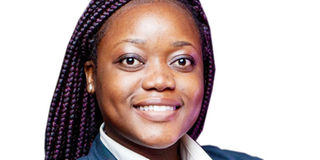Let our privileges not blind us

Sibongile Phiri
What you need to know:
- We realise we could easily be the next Ahmaud Arbery, Breonna Taylor or George Floyd. That is why many of us, Africans, became empathetic in relation to the fight against racism.
Before you defend an action another deems oppressive, unjust or unfair, take a moment to introspect on whether you are speaking from a position of privilege.
Privilege is defined as a special right, benefit, advantage, or immunity granted or available only to a particular person or group. A privilege is not enjoyed by everyone.
One can be said to be privileged in relation to their race, age, tribe, gender, economic standing, family background or alma mater. We can assume that most people in society enjoy one form of privilege or the other, resulting in an unfair advantage over others without that particular privilege.
A stark example of privilege is the gender-based advantage men have over women, who simply, because of sexual orientation, are easy targets of sexual assaults and other forms of Gender-Based Violence (GBV). Femininity continues to attract misogynists, chauvinists and criminals.
Due to financial advantage, it is also easy for corporate heads to decry the increment of minimum wage based on the economic environment. They disregard the life of their employees and their livelihood. Imagine how much worse that economic environment is for someone who you pay around $1 (about Shs3,700) or less per day?
People are quick to brand the youth as “lazy” and “entitled” when they demand better working conditions on the premise that it is the “rite of passage” which they themselves went through. These disregard the current economic state of their country and the implicit biases that have developed overtime. By implicit biases, I mean the stereotypes in regards to one’s tribe, alma mater, gender, race and social class.
Many do not consider these aspects when they offer unpaid internships or when they pay young talent with “exposure”. It is not certain these same people would accept payment in the form of exposure considering obligations they have for which money is needed.
We are quick to write off aggrieved people speaking up and protesting against various forms of unfair policies, oppression and prejudice as idlers, irrational, ungrateful, entitled, mentally unsound and opportunistic and yet this may not be so.
When women stand up against sexual assault and oppression through various movements, they are ridiculed and dismissed as being angry and bitter women. They are told to “tone down” their voices.
However, when it comes to the Black Lives Matter movement, almost all of us understand the fight and support those protests against the oppression and brutality that the Black people have faced in the hands of systemic racism. This is because most Black Africans realise that they do not have the umbrella of privilege to shelter them from racism regardless of their class or elitism.
We realise we could easily be the next Ahmaud Arbery, Breonna Taylor or George Floyd. That is why many of us, Africans, became empathetic in relation to the fight against racism.
This is why many of us get worked up when people try to downplay the Black Lives Matter movement with the “All Lives Matter” campaign, which a group of White supremacists are trying to use to stifle the voices of those pained and tired of the more than 400 years of oppression.
Many White people do not see and acknowledge their own privilege in a system that has been pegged against the Black man from the onset.
I wish we could all treat other forms of movements and protests against oppression with the same gusto we treat the fight against racism. We should acknowledge that privilege exists and that we could be the ones enjoying a privilege others do not have an advantage of enjoying.
So, the next time we hear someone crying foul at an issue to do with oppression and unfair treatment, let us take a moment to reflect on whether our reaction is based on our own privilege or that we have appreciated the facts and scenario for what it really is.
Ms Phiri a Malawian lawyer and also an advocate of the High Court of Uganda
[email protected]




